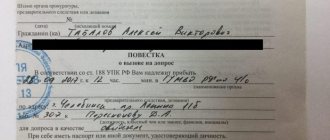How to find out the name of the investigator who is leading the case
1. I need to find out the name of the investigator who is conducting the criminal case, how to do this.
1.1. Call the police, the investigative committee at the duty station, give the approximate date of contacting the police, tell your full name. applicant, explain why the case was initiated and ask who is the investigator in this case.
2. How to find out the name of the investigator if it is carefully hidden.
2.1. First, explain why this is for you and how it relates to you.
2.2. Write a complaint to the prosecutor's office, the head of the investigative body.
3. I need to find out by last name and first name in which department the investigator works.
3.1. This is not an information desk where we can know.
4. How can I find out the name of the investigator?
4.1. Hello, Tatyana, call the police, the investigative committee at the duty station, give the approximate date of contacting the police, tell your full name. applicant, explain why the case was initiated and ask who is the investigator in this case. You can give me the case number if you know.
4.2. It depends on what material or criminal case. You need to know the number of either the material or the criminal case. Depends on the circumstances that gave rise to this material. We need to start with the police department in which this happened.
5. How can I find out the name of the investigator in charge of a suspect’s case?
5.1. Good day to you. In general, the suspect should know the name of the investigator or hire a lawyer by agreement. Good luck and all the best.
5.2. In order to find out the name of the investigator investigating a criminal case, you can contact the duty station of the police department in which the criminal case is being investigated.
5.3. Hello. If you are a victim or a suspect, then you can find out from the head of the investigative department, he knows to whom he has transferred the criminal case against this person. Good luck to you.
5.4. And who refuses to answer? The decision to bring the person in as a suspect, as well as the interrogation protocol, was signed by the investigator. If there is no information, the suspect needs to go himself, or a lawyer can find out.
5.5. Good afternoon, Guest! If you are a party to criminal proceedings, you can submit a request to the head of the Investigation Department. I advise you to contact lawyers via personal email; they will help you solve your problem and draw up the necessary documents. You can successfully resolve your issue with legal assistance. Thank you for using the site's services!
5.6. Hello! The person involved in the case can find out this through the head of the investigative department (department of investigation). In addition, the suspect must definitely know who is leading his case.
6. How to find out the name of the investigator who led the case 1.5 years ago.
6.1. Good afternoon. In the materials of the criminal case, if the court allows you to familiarize yourself with the materials of the considered case. Contact the court that issued the sentence.
6.2. Hello, Olesya. To do this, you need to contact the police department where the investigator worked and find out. Good luck and all the best to you.
6.3. Hello. How to find out the name of the investigator who led the case 1.5 years ago. You can submit a request to the department, or ask for a copy of any decision from the case. Unless, of course, the case was carried out against you. All the best. Thank you for choosing our site.
6.4. Olesya good evening. There are only two options - the first is to write a written request to the body in which the investigator worked in the name of its head, preferably with the number of the criminal case. The second option is to write a written request addressed to the chairman of the court where the case was heard to familiarize yourself with the case in the court archives. If the case was not conducted in relation to you, then you will need a power of attorney from the person in relation to whom it was conducted.
7. How can I find out the name of the investigator in charge of a suspect’s case?
7.1. You need to contact a lawyer.
8. Where should I go to write a statement against my investigator who is bullying me? He won’t give me my phone, talks to me like I’m carrion, refused to give my last name and rank (but I still found out), and threatened today that I won’t see my phone until the trial. How can I get my phone back before the trial? And how to change the investigator?
File a complaint with the prosecutor (according to Articles 123-124 of the Code of Criminal Procedure of the Russian Federation).
9. I wanted to ask how to find out the name of the investigator who is handling the case of my common-law husband.
9.1. Hello. Ask your husband.
9.2. Call the police department and find out.
10. My question is this: where can I find out the name of the investigator leading the criminal case? I have a case number, and I know which department of internal affairs is handling it. But the duty station does not provide such information (they say that they do not record it)
10.1. Dear site visitor! Everything they say is correct. Contact the CO head directly and he will provide you with all the information.
10.2. Who are you and what is your status?
10.3. In the office of the Ministry of Internal Affairs, in person.
11. Please, how can I find out the name of the investigator who is leading the case, if the defendant is in another region, I am his common-law wife.
11.1. Call the head of the investigation, tell the name of the person involved, possibly the full date of birth. Decide what investigation (investigative committee or Ministry of Internal Affairs)
12. How to find out the name of the investigator who is leading the case. We don’t know anything, just the suspect (my brother) is sitting in pre-trial detention center 3 in Moscow.
12.1. Contact the appropriate police department, starting from the scene of the crime (geographically). As a close relative, you have the right to receive such information. If you refuse, contact the Investigative Committee of the Prosecutor's Office.
12.2. Hello, Ekaterina, Unfortunately, they will not give you any information. The lawyer defending the brother will be able to obtain all the information about the progress of the investigation.
13. I submitted an application, according to which a letter was received about the initiation of a criminal case, and it was transferred to the investigative department. But there has been silence for a year now. How to find out about it? I have the case number and my personal number, the name of the investigator, at that time.
13.1. Good day. In this situation, you need to find out the investigator's number and try to contact him. I wish you good luck in resolving your issue.
13.2. Good afternoon. It is necessary to send a request to the investigative body to provide information about the progress of the case and the measures taken to find the perpetrators. But, most likely, the case was suspended due to the absence of the person to be held accountable and you will be sent a copy of the decision to suspend the case.
There are many life situations when it is necessary to obtain the most complete and truthful information about a person. For example, when hiring, each employer needs to know whether the applicant has been prosecuted or served a sentence in specialized institutions. Bank employees also check the reliability of citizens before giving them a loan. In addition, a criminal case by last name may need to be found by the participant in the process, who for some reason was unable to attend the final hearing. You can obtain the necessary information through the Register of all ongoing court cases on specialized Internet resources.
When can they be summoned for questioning by the Investigative Committee?
The Investigative Committee is summoned to testify. This can happen in several cases.
Conducting an inspection - a criminal case has not yet been initiated, but information on the received statement of crime is being verified.
How does this happen
The investigator calls for explanations.
This is not yet an interrogation, and attendance is not strictly required. But it is better not to ignore this meeting, but to prepare and give the most necessary information. You can also include the evidence base. Perhaps this will all end. Interrogation - carried out when a criminal case has already been initiated. That is, an inspection was carried out and signs of a crime were identified. This means that everything is already very serious.
How does this happen
They are summoned for questioning by subpoena, but they can call and set a date and time to appear.
The most reasonable thing is to give your consent and come, always with a lawyer. Otherwise, they can come home, to work and take you to the investigator. In this case, there will be no time either to call a lawyer or to prepare for the conversation. What needs to be clarified in any case: who is being called in for questioning - a witness or a suspect. Each of them has their own rights.
For example, a suspect is required by law to have a lawyer, but a witness is not required to have one. A suspect may refuse to testify in the absence of a lawyer, but a witness does not have the right to do so.
Just because you've been called as a witness doesn't mean you can relax. The status can be changed to suspect if during the interrogation the investigator sees signs of a crime in the actions of the witness. And a witness has much less rights than a suspect.
Often, investigators call a person as a witness, conduct an interrogation, as a result of which he becomes a suspect.
If you are summoned for questioning, contact a lawyer immediately.
Rules of law
According to the adopted law FZ-262 on the provision of open access to information about the activities of different courts in all subjects of the federation, you can obtain information about court decisions, initiation of criminal cases, meetings and orders, that is, complete information via the Internet. Despite the fact that the database is open to any user, some information is still not publicly available.
It is prohibited to disclose the following information:
- about serious and especially serious crimes before the verdict is announced;
- matters related to state security;
- all questions and cases regarding the adoption of minor children;
- cases in which a person is declared incompetent;
- a number of crimes related to sexual integrity;
- when making changes to acts of civil registration (registry office).
The list of exceptions is specified in Article 15 of the above-mentioned Federal Law-262.
How to find a court decision by the name of the defendant?
The information revealed becomes available for study.
Using a database on the Internet, anyone can obtain information about any court decision in criminal, civil and other cases. Today, each court publishes its decisions on its own website. The search can be carried out using any known data: date, court, case number, surname of the judge, surname of one of the participants in the process.
Is it possible to independently find out about the initiation of a criminal case?
Your own knowledge can help in resolving the issue. So, in order to initiate a criminal case, certain deadlines are provided. They are common to all crimes, but can be changed in individual circumstances.
In general, the initiation of a criminal case means that there is a need to conduct criminal proceedings. The decision is made as a result of analysis of available data and is supported by the publication of an appropriate document in which this fact is recorded.
There are cases when a person is detained, and while he is in the police, he cannot understand whether a criminal case has been initiated or not. His relatives also show justified concern about this issue. To clarify the situation, you need to look at the Criminal Procedure Code, namely Article 144, which contains information about the deadlines. According to it, the urgency of the procedure for investigators and interrogators can be determined in the following format:
- from the moment the application is submitted, it must be checked for three days, as a result of which a decision must be made: to open a criminal case or to refuse it;
- if there are sufficient grounds, the inquirer or investigator has the right to apply to his superiors with a request that the inspection be extended to ten days (the reasons for this may be, for example, the need to conduct an examination);
- if it is necessary to check the organization’s documentation or conduct an audit, the responsible persons send a corresponding petition to the prosecutor’s office, where they have the right to decide to extend the period to thirty days.
Search options
Personally applying for information to the department of the Ministry of Internal Affairs or the court office is a reliable method, but extremely inconvenient, as it requires considerable time. In addition, in court, the data will be given only to the participant in the process.
Through a single database available online, you can check the information:
- About initiating a case.
- About criminal prosecution.
- On debt collection in court.
- About the presence of a criminal record (current, expunged and expunged).
- About decisions on absentee proceedings.
Therefore, citizens are increasingly trying to find out about criminal cases by last name online. To do this you can use:
- Portal "Justice".
- Database of the Ministry of Internal Affairs.
- FSSP website.
- Court website.
Each of them has its own characteristics.
Justice system
Unauthorized persons can obtain information using the Justice system. It contains data on all sentences of courts at various levels.
To search within this system, you need to know the name of the participant in the case and a number of clarifying data. All of them will need to be entered into a special form on the site.
Have a question for a lawyer? Ask now, call and get a free consultation from leading lawyers in your city. We will answer your questions quickly and try to help with your specific case.
Telephone in Moscow and the Moscow region: +7
Phone in St. Petersburg and Leningrad region: +7
Free hotline throughout Russia: 8 (800) 301-39-20
By the name of the defendant
For a case named after the defendant on the Justice website (https://sudrf.ru), you need to follow a simple algorithm:
- Visit the “Search for judicial acts” section.
- Enter the defendant's last name.
- Select the desired option from the list that appears.
Searching for a criminal case by the name of the defendant will look a little different.
By the name of the defendant
In this case, you need to enter the “Search by cases and judicial acts” section. In the “Participant in the process” field, you will need to enter the last name and click the “Find” button.
All that remains is to find the desired case in the list of results.
All courts today are required to submit information about cases using a special form. This form is standardized for all regions of the Russian Federation, which greatly simplifies the search. Knowing the region or data of the specific court in which the trial took place can significantly simplify the search. This is especially true for viewing data on decisions of arbitration courts. They can be found on the portal kad.arbitr.ru.
Ministry of Internal Affairs database
This database contains information about:
- Wanted persons.
- Invalid passports.
- Criminal prosecution and conviction.
You can search for information about a criminal case by last name, date of birth and passport information.
But strangers can only obtain a criminal record certificate if they have a power of attorney from the convicted person.
FSSP database
Bailiffs publish online lists:
- Debt collection proceedings.
- Suspects of crimes.
The powers of bailiffs include initiating both administrative and criminal cases.
Court website
Despite the obligation to publish all court case data online (with some exceptions), courts do not update their database very often.
To obtain data you need to know:
- Court address.
- Date of the meeting.
- Case number.
- Full name of the judge.
As a rule, outsiders do not have this data and this method of searching for information is not suitable for them.
Where to go
If the information is unknown, then you need to wait for the period provided by law, and then contact the necessary authorities. So, you can find out this information in the department of the Ministry of Internal Affairs to which the application was submitted. Art. 145 of the Code of Criminal Procedure provides for the obligations of investigative bodies to timely inform interested citizens about the results.
Thus, if it turns out that a criminal trial has not been initiated within the time period specified by law, and the corresponding resolution has not been issued to refuse to initiate a criminal case, a person can safely write a complaint to the prosecutor’s office. To do this, you need to submit a statement in which you report the inaction of law enforcement officers.
What Internet services to use
The virtual network today offers enormous opportunities for users to find the necessary information, for example, if the last name of the person of interest is provided. But not all the information here turns out to be reliable. For example, to obtain data related to government agencies, it is best to use only official sources. For example, you can find out about a court hearing via the Internet through the State Automated System “Justice”. This information is openly provided to all users.
Important! It is not possible to check whether a case has been opened against a person or not on the official website of the Ministry of Internal Affairs. But even in the police department itself, data on initiating a criminal case may not be disclosed to every person, since they are confidential. Therefore, you should not trust sources on the Internet that promise that they have the necessary information. Most likely, the information there will turn out to be untrue, and the user will have to fork out money to gain access to it. As a result, he will be left without money and information.
What surprises can you encounter during interrogation?
No matter how much you prepare for this procedure, it will be stressful for you. During the interrogation, no one will stand on ceremony with you; you may hear profanity and harsh criticism of your actions.
You will be asked uncomfortable questions and interpret the answers differently in order to influence your emotional state. Emotionally, you can start making excuses and say unnecessary things. Therefore, it is important not only to control your behavior, but also to keep a lawyer with you. His job is to protect the client and smooth out rough edges.
Seizure of a phone, tablet and other equipment that will be available. Clean up unnecessary, controversial, ambiguous information in advance. This also applies to laptops, mail, and cloud services.
If necessary, what has been erased can be restored. Think about it. If you have not thought through these actions, it is better to give your phone or tablet to a lawyer before interrogation; they cannot seize anything from him, they have no right.
Appointment of examination. This could be a handwriting examination. You will need to provide handwriting samples, signatures, write 10 sheets of text, and also put your signature on five sheets.
Using a polygraph. Remember that the specifics of such research exclude violent and coercive use.
Search your home or work. This may happen at inconvenient times, such as early in the morning or late in the evening.
They can handcuff you and detain you for 48 hours, sending you to a temporary detention center. The detainee has the right to call relatives. He can report where he is, why he was detained, ask to collect documents about employment, housing and marital status, quickly obtain references from neighbors and from his place of work (these documents may be useful in court when considering a petition for a preventive measure).
When the notification arrives
As stated above, it is the responsibility of law enforcement officials to inform individuals about the adoption of a particular decision. Regardless of whether the case is initiated or it is decided to refuse it, the registered application is assigned an identification number. The applicant and other persons must be notified of the further fate of the application.
If a decision is made to initiate a criminal case (based on Article 146 of the Code of Criminal Procedure) or refuse to do so (based on Article 148 of the Code of Criminal Procedure), employees must send a corresponding notification with a copy within one day.
This procedure applies not only in Russia. Many neighboring countries in the post-Soviet space, for example, Kazakhstan and Ukraine, have adopted similar rules.
Deputy Head of the Main Investigation Department (GSU) of the Investigative Committee, Major General of Justice Sergei Zolotarev, dismissed last week by decree of President Putin, was appointed to the Prosecutor General's Office. The head of the supervisory department, Igor Krasnov, based on a report from his deputy, also a member of the investigative committee, Anatoly Razikin, appointed General Zolotarev as the head of one of the key departments of the Prosecutor General’s Office - the main department for supervision of investigation, inquiry and operational investigative activities.
Deputy Head of the Main Investigation Department (GSU) of the Investigative Committee, Major General of Justice Sergei Zolotarev, dismissed last week by decree of President Putin, was appointed to the Prosecutor General's Office. The head of the supervisory department, Igor Krasnov, based on a report from his deputy, also a member of the investigative committee, Anatoly Razikin, appointed General Zolotarev as the head of one of the key departments of the Prosecutor General’s Office - the main department for supervision of investigation, inquiry and operational investigative activities.
According to the order of Prosecutor General Krasnov, the basis for hiring Sergei Zolotarev was a statement on his part, supported by a report from Deputy Prosecutor General Anatoly Razinkin appointed on May 20. General Zolotarev, having transferred to the Prosecutor General's Office, received not only a promotion to the head of the main department (in the Investigative Committee he was deputy head of the Main Investigations Directorate of the Investigative Committee), but also a significant increase in salary. His salary was set at the rate of 88% of the salary of the first deputy prosecutor general Alexander Buksman, 70% of additional payment for length of service, another 50% for the complexity of the work and 10% as the holder of the badge of an honorary employee of the prosecutor's office, which he received even before moving to the investigative committee. Let us note that before joining the Main Investigative Committee of the Investigative Committee of the Russian Federation, the general headed the liquidated department of procedural control of the Investigative Committee of the Russian Federation, having gained the necessary experience in supervisory work, which he now uses in the Prosecutor General’s Office.
Anatoly Razinkin will supervise the work of the main department, the head of which is Mr. Zolotarev, who has become a senior adviser to justice. He also retained control over the directorate for oversight of compliance with laws on federal security, countering extremism and terrorism, as well as the directorate for oversight of the military-industrial complex.
Let us note that the main department for supervising the investigation was headed by Yuri Karapetyan, a native of the Moscow Region Prosecutor's Office, about whose work, according to some information, Prosecutor General Igor Krasnov had questions.
It should be expected that in the near future two other main departments will also receive new heads: the Main Directorate for Supervision of the Investigation of Particularly Important Cases (approves charges in cases being processed by investigators from the central offices of the Investigative Committee of the Russian Federation, the Ministry of Internal Affairs and the FSB), the head of which is Vladimir Yudin, who has reached 70 -years old, retired, and the Main Directorate for Supervision of the Execution of Anti-Corruption Legislation of the Prosecutor General's Office of the Russian Federation. Alexander Rusetsky, who has headed this main board since 2015, also resigned.
Nikolay Sergeev









